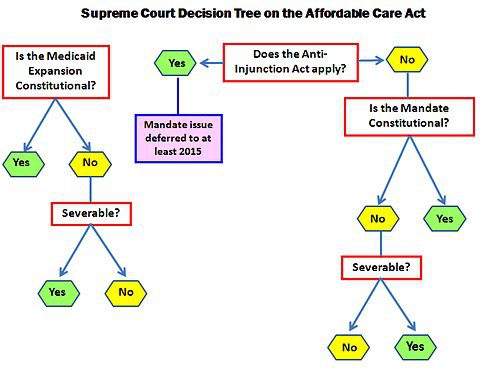The biggest Supreme Court Ruling in a decae is expected this Thursday before the Summer recess. Yet thats when the fun begins. Possible outcomes: Possible outcomes:
If individual mandate is repealed but leave other PPACA provisions in place, this outcome could greatly limit the coverage goals underpinning the Affordable Care Act and cause significant problems in the health insurance markets. For example, MIT economist Jonathan Gruber said, “Without a mandate the law is a lot less effective. The market will not collapse, but it will be a ton more expensive and cover many fewer people.” While States such as NY may follow Massachusetts and set up their own Individual Mandate this becomes challenging with less Federal funding. Funding for the individual market place subsidy with subsidies could collapse. See subsidy calculator here. Eliminating the mandate would increase premiums and mean that far fewer of the uninsured would be covered. This is known as adverse selection where the sick population would be willing to pay higher premiums and forcing the healthy population to opt out of exchange. States such as NY in fact have seen the Individual Market spiral out of control as they are high risk adverse group in order to supplement the preferred guaranteed non-preexisting condition group marketplace. Furthermore, NYS requires guaranteed issue for pre-existing condition for individual members with prior coverage. The decision would punt health-care reform back to Congress, which “isn’t doing anything this year” and thus create major uncertainty going into the November elections. Taxes on pharma and medical devices would remain, while managed-care and hospital companies would suffer big losses. Insurers would be forced to take on sick patients without benefitting from the healthy ones who would have been enrolled under the mandate. In this scenario, a lot of companies would simply cut their losses and leave the individual insurance market altogether; the law would essentially “run them out of business. Either way the lack of uncertainty has delayed hospitals and insurers from new hires and taking decisive actions. Same time next week we hope to celebrate July 4th with certainty. |

Interesting how the law may actually prevent the government from “providing for the general welfare”. The Constitution is not a list of suggestions, so I guess this issue has to be debated. Still, if I needed health insurance right now I wouldn’t be in the least bit interested in legalese. I wonder why Medicare didn’t provoke this kind of debate.
Larry, the individual mandate should have been filed as a tax. It would have made the constitutionality issue a little easier. Regardless, the individual mandate penalties never had legs to stand on to begin with – see https://360peo.com/p/individual-mandate-penalties.
With guaranteed issue waiving pre-ex conditions wouldn’t you just pay the penalty of 1% when you get sick? Think about it, the hospital inpatient copay now is $1000, thats 1% of someone earning $100,000!
Any way you slice it, providing coverage in this country will be a messy process at best because we don’t have the political will to just give everybody Medicare and keep printing money until its paid for. Should we not have national healthcare just because 1% of 100K is 1K? How many Americans will read that deeply into the problem and actually crunch those numbers? They’re too busy staring into their iPhones. Maybe, we shouldn’t have national healthcare. We’re already the world’s first global superpower. If we continue to perfect our society what will all those countries who keep their best and brightest from coming here by providing a more generous welfare state than the US do next? But if we should insure every American, we’ll have to continue to tolerate these deficiencies until we arrive at single payer national healthcare incrementally.